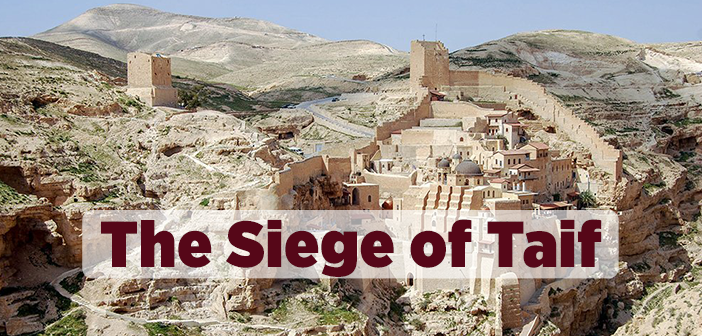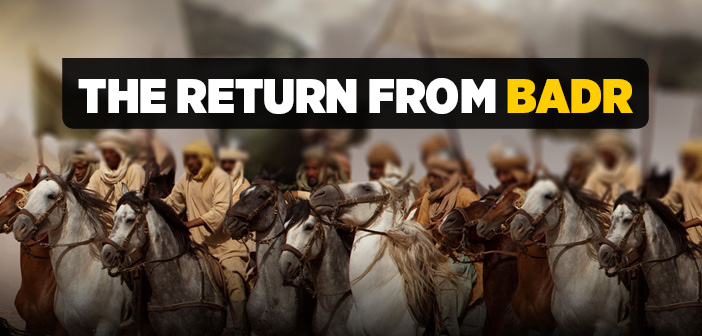What is the siege of taif? What is battle of taif?
Taif, a prominent town in Hijaz worthy of being called a paradise on earth, had a strongly fortified castle set on a hilltop. The siege laid by the Muslim army on Taif therefore proved to be a demanding and severe struggle.
The Siege of Taif was not a revenge for the maltreatment the Blessed Prophet was subjected to years ago by her locals but was rather a continuation and the final curtain of the Battle of Hunayn. A significant amount of the enemy soldiers including their leader Malik ibn Awf, who fled from the passage of Hunayn, had come to Taif, seeking refuge in the castle. There, allying themselves with Banu Thaqif once more, they prepared for a brand new war of defense.
The Siege saw the Muslims put numerous strategies and various new equipments to use. Yet, the walls of the castle were holding strong against the string of attempts by the Believers to pass over. Neither were they able to draw the enemy outside of the castle. When Khalid ibn Walid -Allah be well-pleased with him- called on them to send a warrior outside for a one-on-one challenge they shouted out, “We do not have anyone that can stand his ground against you!”
The Blessed Prophet -upon him blessings and peace- thereupon remarked, “The enemy has now retreated into its den like a fox. Even if left to their own doing, they will not be able to inflict harm anymore!” They were now debilitated as it was and the Noble Messenger -upon him blessings and peace-, being the prophet of mercy he was, saw no further point in prolonging the siege, as he wished for the guidance of the people of Taif, not their annihilation. Before long, he commanded for the siege to be lifted.
As the siege was coming to an end, the Companions asked for the Blessed Prophet -upon him blessings and peace- to curse Banu Thaqif, who were inflicting much damage on the Muslims. But the Prophet of Mercy -upon him blessings and peace- instead prayed for their guidance. “My Lord! Grant guidance to Banu Thaqif! Send them to us!” he implored Allah, glory unto Him, right before his departure from Taif. Before long, Banu Thaqif came to the Blessed Prophet -upon him blessings and peace- of its own accord and became Muslim. (Ibn Hisham, IV, 134; Tirmidhi, Manaqib, 73/3942)
The Blessed Prophet -upon him blessings and peace- did not merely avoid cursing a tribe that years ago pelted him with stones, leaving him bloodied and bruised, but he also nurtured a genuine desire for their guidance. Indeed, their arrival a year later to express their wish to become Muslim made the Blessed Prophet -upon him blessings and peace- so happy that he spared a few days to attend to them.
The most important gain from the Siege of Taif, for the time being, was the acceptance of Islam by the numerous slaves from the other side, who, following the promise of the Blessed Prophet -upon him blessings and peace- that they would become free if they became Muslim, defected from the enemy army and joined the Believers.[1]
Abu Zuraa -Allah be well-pleased with him- recounts:
“When the Messenger of Allah asked for his mount as he was leaving Qarn’u Manazil during the Taif Campaign, I prepared his camel Qaswa. I held its reins until he mounted it; then handing the reins over, I sat on the saddle behind him. The Messenger of Allah was gently lashing the camel in the back with his whip to get it moving and being behind him, I was feeling the lash strike me each time. He then looked behind and asked, ‘Is the whip hitting you?’ ‘Yes, Messenger of Allah’, I replied, ‘may both my parents be sacrificed in your way!’
Afterwards we reached Jiranah, where there was some sheep held near a corner. The Messenger of Allah asked something about them to the man in charge of the spoils and the man gave the information demanded of him. Right after their conversation, the Messenger of Allah called out for me. ‘Here I am, Messenger of Allah’, I responded.
‘Take these sheep’, said the Messenger of Allah, ‘in return for the whip lashes you received in the evening!’ I counted the sheep; there were exactly one-hundred and twenty in number. Those were the possessions I benefited the most from.” (Waqidi, III, 939)
The sensitivity shown by the Blessed Prophet -upon him blessings and peace- here towards the rights of others would suffice to shed a guiding light over all times and places.
[1] Bukhari, Maghazi, 56.
Source: Osman Nuri Topbaş, The Prophet Muhammed Mustafa the Elect II, Erkam Publications





